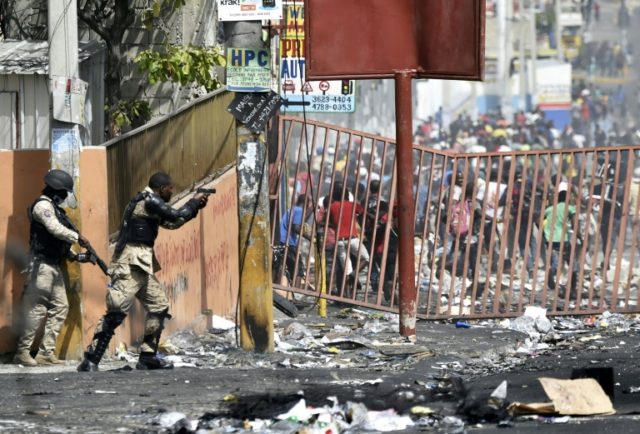Port-au-Prince (AFP) – Scenes of anarchy alternated with tentative signs of a return to normal life in Haiti’s capital, with calls for a general strike Monday after two days of deadly looting and arson triggered by a quickly-aborted government attempt to raise fuel prices.
With the death toll rising to four, protesters in the impoverished Caribbean country called for a two-day general strike, despite the government’s climbdown over the price increases.
Many Haitians are now demanding the immediate departure of President Jovenel Moise.
“If the president stays one more day, the game will take on a new appearance: we will cut off the roads and burn everything, because we have nothing else to lose,” said one masked protestor.
Groups of young men trying to extort money from motorists as well as pedestrians controlled various intersections and roads in Port-au-Prince on Sunday.
Local radio reported that groups of armed people in civilian clothes had been seen in some downtown districts.
In the heart of the capital, AFP journalists saw shops ransacked as protestors demanded Moise’s exit.
Some aggressive young men carried knives, and special police crowd control units fired their guns into the air and detonated tear gas.
Alongside these chaotic and violent scenes, a partial return to normal life occurred in parts of the capital.
After mass, many fruit and vegetable merchants had taken up their places again on the sidewalks, and motorcycle taxis were back at their usual intersections — even if customers were scarce.
Automobile traffic timidly returned to several roads where police had removed barricades.
Some flights returned, too, with three aircraft landing from the United States after all airlines cancelled service on Saturday.
But uncertainty remained, and the embassies of France and Canada said they would remain closed on Monday.
Moise had urged demonstrators late Saturday to “go home,” saying the price hike suspension had “corrected what had to be corrected.”
His televised speech disappointed much of the population and the political class: “We were expecting another speech, a serene analysis of the situation that has prevailed in the country in the last two days and caused so much loss of life and materials,” lawmaker Jerry Tardieu told AFP.
The unrest followed a government announcement on Friday that gasoline prices would rise by 38 percent, diesel by 47 percent and kerosene by 51 percent starting this weekend.
– ‘Carried away’ –
In suspending the price hikes, Prime Minister Jack Guy Lafontant on Saturday emphasized that “violence and democracy are fundamentally incompatible.”
Even before the fuel price controversy, deputies had already begun a debate on his future, and Saturday’s U-turn could lead to the government’s fall.
On Friday night, the bodyguard of an opposition-party politician died in an altercation with demonstrators in central Port-au-Prince as he attempted to get through a roadblock. His body was then burned in the road.
On Saturday afternoon, an AFP journalist saw a young man who had been shot dead. Two other people have also lost their lives.
Parliamentary discussions are underway to determine the next steps aimed at calming the crisis, with some elected officials urging the immediate resignation of the prime minister.
On Sunday one Haitian, Alphonse Charles, expressed both the frustrations and the sense of fatalism felt by many of his countrymen.
Standing next to the remains of his torched car near burned and looted shops, he blamed politicians but lamented that people had gotten “carried away.”
“It’s the reality of the country: when we live in Haiti we are angry, frustrated with the way things are managed by politicians.”
But “I have to go on living,” he added. “We will not get carried away just for that.”

COMMENTS
Please let us know if you're having issues with commenting.